Law Enforcement or War? Both!
My latest collaboration with Butch Bracknell, "Ahmed Abu Khattala and the Miranda-Rights Question," has posted in The National Interest.
My latest collaboration with Butch Bracknell, “Ahmed Abu Khattala and the Miranda-Rights Question,” has posted in The National Interest. It’s a complicated piece that largely defies excerpting but here’s the setup:
The September 11, 2012 attacks on U.S. diplomatic facilities in Benghazi, Libya were, according to U.S. law enforcement and intelligence sources, designed and led by Ahmed Abu Khattala, a Libyan jihadist. Recently, Khattala was captured by U.S. special-operations forces and transported to a U.S. Navy ship in the Mediterranean for debriefing, presumably by intelligence community (CIA and FBI) interrogators. Khattala was then transferred to FBI custody from military detention, even though he remained on the U.S. Navy ship for transit. He was flown off the ship and transported to the United States to answer a June 26, 2014 federal criminal indictment, alleging a single count of conspiracy to provide material support to terrorism. He remains in pretrial criminal detention after his initial appearance before a U.S. magistrate in the U.S. District Court for the District of Columbia on June 28.
Given the intensity of the political squabbling over how the Obama administration handled the Benghazi incident, there has been surprisingly little attention paid to Khattala’s arrest and detention. There has been unsurprising, yet irresponsible, insistence from some quarters that he be sent to Guantanamo Bay for extended detention as an unlawful enemy belligerent. The usual suspects have expressed concern that Khattala was turned over to law enforcement too quickly, allowing insufficient time to extract all the valuable intelligence he may have had to offer. Absent compelling evidence otherwise, we’re prepared to trust the judgment of intelligence professionals over grandstanding politicians on that score.
Our concern is the opposite one: that the intelligence interrogation may have violated Khattala’s due process rights, thus tainting the upcoming criminal trial.
More than a thousand words later, we conclude:
Ultimately, these cases take us back to a longstanding debate in terrorist cases: the degree to which they are simply crimes to be adjudicated through existing law-enforcement practices or acts of war to be handled through military means and under the law of war. With Khattala, Warsame and Ghaith, the administration is trying to have it both ways. It is a clever theory that may prove to be untenable—legally and perhaps morally.
For those interested in the rule of law, the intervening portion raises interesting, perhaps even troubling, questions and offers some insights from the case law. Alas, it’s not obvious that the president, Congress, or general public gives a damn.
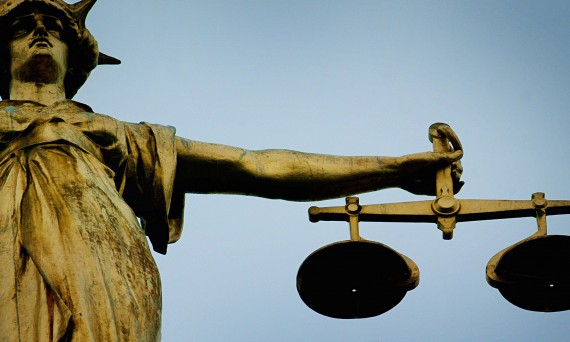

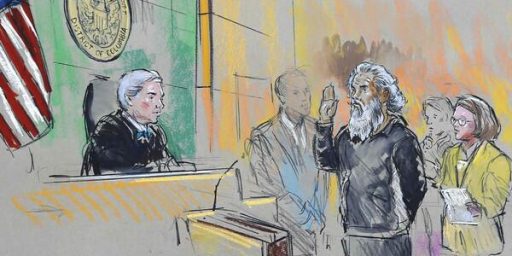
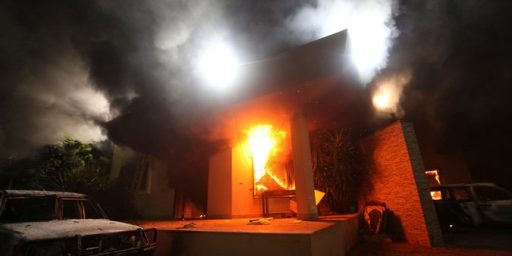

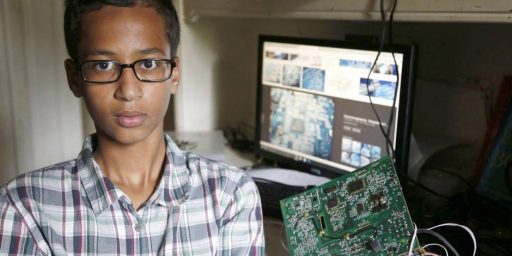
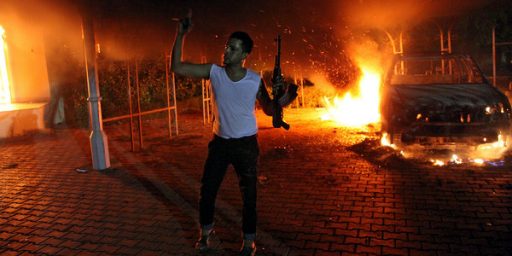
Khattala was captured by American forces in Libya, spirited out of the country without the participation of the Libyan government, and brought to the US?
If so, that’s not an arrest, and it’s not an extradition. I have no idea what it is, but I imagine we would be pretty pissed off if other sovereign nations did it on our soil. The question of Miranda rights seems pretty tame, compared to the circumstances of his extraction in the first place.
@DrDaveT: The Libyan government had plenty of time to hunt down the murderers and cough them up. The government of Libya should be happy: one less terrorist.
@DrDaveT: true, maybe the libyan aclu will come to his aid- oh wait, i doubt they have such a thing in that mess of a “country”. or maybe their diplomats can get their judges to issue an order or something and lodge a protest……you’re serious right?!
@Tyrell, @bill
It was a legal question. You guys are all about the “Rule of Law”, right?
Yeah, that’s what I thought.
James, war is aghast nation states. Organizations like Al-Queda and ISSI are not nation states but criminal organizations and should be treated as such.
@Ron Beasley:
They really can’t, Ron. Timothy McVeigh? Sure. The Red Brigades and Bader Meinhoff gang? Yup. Probably even the IRA. But AQ and IS* aren’t based in functional states and subject to arrest, extradition, and trial.
In this particular case, I’m fine with either the war or law enforcement tack but very uncomfortable with the blend.
While I share @DrDaveT‘s concern about snatch-and-grabs in sovereign states, I’m not sure exactly where Libya falls on that spectrum right now. I lean towards being okay with it. And I’m okay with the CIA and FBI tag-teaming the guy to extract intel without the niceties of Miranda and lawyers, so long as we follow the conventions of international law.
But after doing that, pretending we can start with a clean state and treat him like a criminal seems unreasonable to me. I’m prepared to be persuaded that there’s good precedent for that grounded in real concern for the rights of the accused. But it seems fishy to me.
IMO the thorniest question is what happens if he’s tried in a civilian court and found innocent? If he’s not released at that point, it’s not justice and it’s not the ruile of law.
@Dave Schuler: No, it’s not. Thus far, we’ve actually been pretty good on that score. Several of the more high profile defendants have been acquitted on the most serious charges against them.
@DrDaveT: see James reply to Ron below. ditto.
Maybe we should have just droned his a$$. There, moral tension resolved- right, James?
@James Joyner:
Just to be clear, I was not trying to express ‘concerns’ in the sense everyone seems to be assuming here. I’m asking a legal question about how it is possible to try someone under US criminal law who was never ‘arrested’ in the way our law assumes. I’m noting that the circumstances of apprehension would seem to trump any concerns about Miranda rights, and generate a mistrial preemptively.
As for ‘concerns’, if you want to go there… Is Pakistan a failed state? This is not an idle question, and not snark. We seem to be at least as willing to act unilaterally on Pakistani soil as we are in Afghanistan or Libya or Somalia — and Pakistan has nukes. If the basis of our actions is that these bad guys are “not based in a functional state”, are we really ready to tell the world (and the government of Pakistan) that we do not consider them a “functional state”?
@Stonetools: Sounds like a plan to me.
@Tyrell:
Actually that was a little tongue in cheek. The moral conundrum here is that if you seize the terrorists and bring them here, you immediately have some liberals complaining about lack of due process, interrogation techniques, indefinite detention, etc. One way to avoid all this is to have the Administration make a Star Chamber determination of whether the target is really guilty of terrorism, then just blow the target up on site. Essentially you prevent liberal agitation at home about due process for the target by giving the target even less due process. And you do this by calling drone attacks war. War doesn’t require DP.
Frankly James is right. It is a puzzle as to how to proceed. One thing is sure- the simplest dlution is the most extreme one. May not be the just solution though
@Stonetools: @Stonetools: I can think of two examples that may apply to the situation of which you write. The infamous Booth Conspirators trial: a military trial of civilians, with dubious procedures and mysterious circumstances.
The Nuremberg War Trials after WWII. While some of the top Nazi leaders were tried, many were not.
Don’t understand the handwringing.
The gentleman, if found to be guilty of the offenses we see him charged with, has committed terrible crimes against the U.S. Snatching him seems to me as reasonable as the Mossad snatching Eichman. If treaties and protocols were broken that is part of the cost of the operation that the planners had to consider but they do not constitute a total ban on such ‘renditions’.
The miranda warning does not have anything to do with what a person charged with a crime can say. Obviously they can say anything they want; they still enjoy the 1st Amendment. Miranda controls what may be used in court. There is a hearty exemption to miranda in the Public Safety Exception (since 1982, I see). The Justice Dep’t has used two completely separate teams of interrogators since 2011 (the Warsame case — once mirandized, he kept singing) that seems to have passed muster in federal courts so far.
I suppose there are scholars and gentlefolk who could improve on the present system. I don’t think they’re found here.
@Stonetools: A hypothetical question for you, my friend: Suppose that Mr Abu Khattata had been inaccessible to our special ops personnel. Would your tongue-in-cheek advocacy of a ‘drone and missile’ become real advocacy?
It seems to me that if Mr Al-Awlaki had been in Benghazi enjoying a beach house alone, we’d have him in custody. And that if Mr Abu Khattala had been in deepest Yemen, he’d be dead. And either outcome is probably just fine.
@Stonetools:
And there is the one charge against President Obama that might actually be worthy of an impeachment — that he’s a war criminal, using the might of the US military to murder foreign civilians (and anyone who happens to be standing near them) without due process.
I’m not going to hold my breath waiting for the Republicans to advance that case, though.
@DrDaveT: Pakistan a failed state : interesting question with elusive, unclear answers. See “The Double Game ” article by Lawrence Wright, New Yorker Magazine. Maybe not failed, but in the “at risk” and always troublesone column. Not exactly the country that was expected after WWII. With a country like that the usual protocols don’t apply.
Even today there were US drone attacks there. No, this is act first, ask questions later.
“You gotta do what you gotta do”
“Do you feel lucky, punk?” (Lt. Harry Callahan)
@James Joyner: yes, Ghalani was acquitted of all but one charge on his indictment. Of course, it was enough to incarcerate him for life, so there’s that…